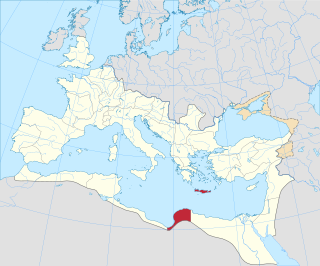Related Research Articles

AD 100 (C) was a leap year starting on Wednesday of the Julian calendar. In the Roman Empire, it was sometimes referred to as year 853 ab urbe condita, i.e., 853 years since the founding of Rome in 753 B.C. The denomination AD 100 for this year has been used since the early medieval period, when the Anno Domini calendar era became the prevalent method in Europe for naming years.
Year 160 (CLX) was a leap year starting on Monday of the Julian calendar. At the time, it was known as the Year of the Consulship of Atilius and Vibius. The denomination 160 for this year has been used since the early medieval period, when the Anno Domini calendar era became the prevalent method in Europe for naming years.

Year 219 (CCXIX) was a common year starting on Friday of the Julian calendar. At the time, it was known as the Year of the Consulship of Antonius and Sacerdos. The denomination 219 for this year has been used since the early medieval period, when the Anno Domini calendar era became the prevalent method in Europe for naming years.

The gens Licinia was a celebrated plebeian family at ancient Rome, which appears from the earliest days of the Republic until imperial times, and which eventually obtained the imperial dignity. The first of the gens to obtain the consulship was Gaius Licinius Calvus Stolo, who, as tribune of the plebs from 376 to 367 BC, prevented the election of any of the annual magistrates, until the patricians acquiesced to the passage of the lex Licinia Sextia, or Licinian Rogations. This law, named for Licinius and his colleague, Lucius Sextius, opened the consulship for the first time to the plebeians. Licinius himself was subsequently elected consul in 364 and 361 BC, and from this time, the Licinii became one of the most illustrious gentes in the Republic.
Rufus is one of the most common of the ancient Roman cognomina.
Sacerdos is Latin for "priest or priestess".

Crete and Cyrenaica was a senatorial province of the Roman Republic and later the Roman Empire, established in 67 BC, which included the island of Crete and the region of Cyrenaica in modern-day Libya. These areas were settled by Greek colonists from the eighth to sixth centuries BC. After Alexander the Great's death, his short-lived empire was partitioned between his generals during the Wars of the Diadochi. Cyrenaica ended up under Egyptian rule, except for Crete, which remained independent.

The gens Caecilia was a plebeian family at ancient Rome. Members of this gens are mentioned in history as early as the fifth century BC, but the first of the Caecilii who obtained the consulship was Lucius Caecilius Metellus Denter, in 284 BC. The Caecilii Metelli were one of the most powerful families of the late Republic, from the decades before the First Punic War down to the time of Augustus.
Quintus Tineius Sacerdos was a Roman senator. He is attested as Consul Suffectus 16 March 193 with Publius Julius Scapula Priscus.
Quintus Tineius Sacerdos Clemens was a Roman senator, who was Consul Ordinarius in 158 with Sextus Sulpicius Tertullus, and Pontifex.
Quintus Tineius Clemens was a Roman senator. He was Consul Ordinarius in AD 195 with Publius Julius Scapula Tertullus Priscus.
Quintus Tineius Rufus, also known as Turnus Rufus the Evil in Jewish sources was a senator and provincial governor under the Roman Empire. He is known for his role unsuccessfully combating the early uprising phase of the Jews under Simon bar Kokhba and Elasar.
Quintus Tineius Rufus may refer to:
The gens Tineia was a Roman family of imperial times. Members of this gens first appear in history in the time of Hadrian; the first to obtain the consulship was Quintus Tineius Rufus in AD 127.
Titus Prifernius Geminus was a Roman senator who lived in the second century. He is best known as a friend and correspondent of Pliny the Younger, who addresses him as Geminus; he served as quaestor to Pliny for the latter's consulship in AD 100, and five letters Pliny wrote to Geminus have survived. Although the letters convey a genuine friendship between the two, the first one appears only in the latter books of Pliny's collection; Ronald Syme explains this may be due to the fact that he, like Quintus Corellius Rufus and Calestrius Tiro, were living in Rome at the same time.
The gens Pactumeia was a minor plebeian family at ancient Rome. Members of this gens are not mentioned by the historians until imperial times, when one branch of the family achieved high rank, holding several consulships during the first and second centuries.
Publius Pactumeius Clemens was a Roman senator and jurisconsult active during the first century AD. He was suffect consul for the nundinium April-June 138 as the colleague of Marcus Vindius Verus; according to Ronald Syme, Clemens is the earliest known consul to hold the fasces in absentia. Although he is known mostly through inscriptions, his life provides examples of how patronage operated during contemporary Rome.
Quintus Camurius Numisius Junior was a Roman senator active during the later second century AD. He was suffect consul for a nundinium in the first half of the year 161 as the colleague of Marcus Annius Libo.
References
- ↑ Paul M. M. Leunissen, Konsuln und Konsulare in der Zeit von Commodus bis Severus Alexander (180-235 n. Chr.) (Amsterdam, 1989), p. 129
- ↑ CIL VI, 1978
- ↑ O. Salomies, "Die Herkunft der senatorischen Tineii", Zeitschrift für Papyrologie und Epigraphik , 60 (1985), p. 199